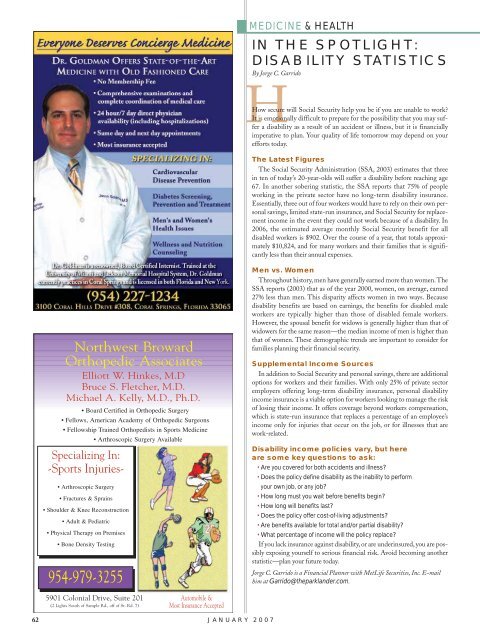Have a Happy & Healthy New Year! - the Parklander
Have a Happy & Healthy New Year! - the Parklander
Have a Happy & Healthy New Year! - the Parklander
Create successful ePaper yourself
Turn your PDF publications into a flip-book with our unique Google optimized e-Paper software.
Northwest Broward<br />
Orthopedic Associates<br />
Elliott W. Hinkes, M.D<br />
Bruce S. Fletcher, M.D.<br />
Michael A. Kelly, M.D., Ph.D.<br />
• Board Certified in Orthopedic Surgery<br />
• Fellows, American Academy of Orthopedic Surgeons<br />
• Fellowship Trained Orthopedists in Sports Medicine<br />
• Arthroscopic Surgery Available<br />
Specializing In:<br />
-Sports Injuries-<br />
• Arthroscopic Surgery<br />
• Fractures & Sprains<br />
• Shoulder & Knee Reconstruction<br />
• Adult & Pediatric<br />
• Physical Therapy on Premises<br />
• Bone Density Testing<br />
954-979-3255<br />
5901 Colonial Drive, Suite 201<br />
(2 Lights South of Sample Rd., off of St. Rd. 7)<br />
Automobile &<br />
Most Insurance Accepted<br />
62 JANUARY 2007<br />
MEDICINE & HEALTH<br />
IN THE SPOTLIGHT:<br />
DISABILITY STATISTICS<br />
By Jorge C. Garrido<br />
How secure will Social Security help you be if you are unable to work?<br />
It is emotionally difficult to prepare for <strong>the</strong> possibility that you may suffer<br />
a disability as a result of an accident or illness, but it is financially<br />
imperative to plan. Your quality of life tomorrow may depend on your<br />
efforts today.<br />
The Latest Figures<br />
The Social Security Administration (SSA, 2003) estimates that three<br />
in ten of today’s 20-year-olds will suffer a disability before reaching age<br />
67. In ano<strong>the</strong>r sobering statistic, <strong>the</strong> SSA reports that 75% of people<br />
working in <strong>the</strong> private sector have no long-term disability insurance.<br />
Essentially, three out of four workers would have to rely on <strong>the</strong>ir own personal<br />
savings, limited state-run insurance, and Social Security for replacement<br />
income in <strong>the</strong> event <strong>the</strong>y could not work because of a disability. In<br />
2006, <strong>the</strong> estimated average monthly Social Security benefit for all<br />
disabled workers is $902. Over <strong>the</strong> course of a year, that totals approximately<br />
$10,824, and for many workers and <strong>the</strong>ir families that is significantly<br />
less than <strong>the</strong>ir annual expenses.<br />
Men vs. Women<br />
Throughout history, men have generally earned more than women.The<br />
SSA reports (2003) that as of <strong>the</strong> year 2000, women, on average, earned<br />
27% less than men. This disparity affects women in two ways. Because<br />
disability benefits are based on earnings, <strong>the</strong> benefits for disabled male<br />
workers are typically higher than those of disabled female workers.<br />
However, <strong>the</strong> spousal benefit for widows is generally higher than that of<br />
widowers for <strong>the</strong> same reason—<strong>the</strong> median income of men is higher than<br />
that of women. These demographic trends are important to consider for<br />
families planning <strong>the</strong>ir financial security.<br />
Supplemental Income Sources<br />
In addition to Social Security and personal savings, <strong>the</strong>re are additional<br />
options for workers and <strong>the</strong>ir families. With only 25% of private sector<br />
employers offering long-term disability insurance, personal disability<br />
income insurance is a viable option for workers looking to manage <strong>the</strong> risk<br />
of losing <strong>the</strong>ir income. It offers coverage beyond workers compensation,<br />
which is state-run insurance that replaces a percentage of an employee’s<br />
income only for injuries that occur on <strong>the</strong> job, or for illnesses that are<br />
work-related.<br />
Disability income policies vary, but here<br />
are some key questions to ask:<br />
• Are you covered for both accidents and illness?<br />
• Does <strong>the</strong> policy define disability as <strong>the</strong> inability to perform<br />
your own job, or any job?<br />
• How long must you wait before benefits begin?<br />
• How long will benefits last?<br />
• Does <strong>the</strong> policy offer cost-of-living adjustments?<br />
• Are benefits available for total and/or partial disability?<br />
• What percentage of income will <strong>the</strong> policy replace?<br />
If you lack insurance against disability, or are underinsured, you are possibly<br />
exposing yourself to serious financial risk. Avoid becoming ano<strong>the</strong>r<br />
statistic—plan your future today.<br />
Jorge C. Garrido is a Financial Planner with MetLife Securities, Inc. E-mail<br />
him at Garrido@<strong>the</strong>parklander.com.

















